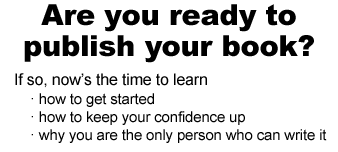Before you can make money writing, you must build a tribe of followers who want, even crave, what you offer.
This is not a new concept.
Long before Seth Godin wrote “Tribes,” there was Phineas T. Barnum, the famous showman, who probably understood the importance of building a tribe for business success better than anyone before him or since. One example of his advertising genius took place in 1850 when he wanted to bring the international singer, Jenny Lind, dubbed the “Swedish Nightingale” to America. But he knew she was unknown in America.
Six months before her arrival Barnum began taking out newspaper ads and posting handbills to spark interest, curiosity and anticipation of this star. His campaign was so successful that upon her arrival 30,000 New Yorkers greeted her at the docks.
Our job of building a tribe is made far easier with the help of social media, but we must tap into our creativity and pursue it with vigor.
In her blog post, Tea Silvestre, the Word Chef, points to the marketing genius of the British TV drama sensation, Downton Abbey, to guide us in building our own tribe.
In case you’ve been napping, Downton Abbey is the PBS British TV series skillfully written by Julian Fellowes (of Gosford Park fame) that takes us into the lives of an early 20th century aristocratic family upstairs and those who serve them downstairs. Not one scone has been left unturned in feeding the hunger of fans to absorb all they can about this series, the characters, the costumes and the castle where it was filmed.
Using the power and pervasiveness of the Internet, Downtonites, like me, watch every interview of the actors discussing their characters, tweet with them, enter the sweepstakes for a trip to Britain and a tour of the castle, and of course, a visit to the shop to buy the DVDs and consider other gift items including replicas of the jewelry worn in the drama. We are even hosting Downton Abbey social events in our homes to enjoy the series with our friends over tea and scones.
Silvestre points to five ways we can build our own tribe using Downton Abbey as a guide. [Give yourself a treat by reading her full article here.]
- Stick by your customers, readers and prospects. Just as the characters in Downton Abbey help one another out of jams across the class lines, you must generously share your expertise with your clients and readers, and ask for their help when you need it.
- Create a quality experience. Develop your site around a theme and brand, complete with logo, language and feel that is recognizably yours.
- Don’t be afraid to break the rules. Even though Downton Abbey is set during a time period bound by rules and restrictions, they sometimes break the rules to help each other. Risk speaking out and stepping up in your writing even if it’s controversial. You may grow closer to your tribe as a result.
- Encourage your tribe to create their own content. The executives behind Downton Abbey devised a number of ways to keep fans engaged between seasons such as giving them behind the scene looks, Tweeting during the Emmys and a Facebook page. As a result fans have spun out activities, parodies and even a drinking game. Likewise you can create activities such as contests, games and encourage them to post photos and share tips.
- Give your tribe choices.Put in place a variety of ways for your fans to engage with you. In addition to Facebook, Twitter, LinkedIn and YouTube, also consider hosting local Meetups, interactive webinars and teleconferences where you share valuable content.
When your book is published, be sure it’s available in ebook and mobile device formats. Place QR codes on your business card, handouts and create an app where fans can access content, resources, play games and learn about updates.
Once you’ve built an engaged tribe, they will not only eagerly buy your work, but will also spread the word, continually expanding your tribe.











